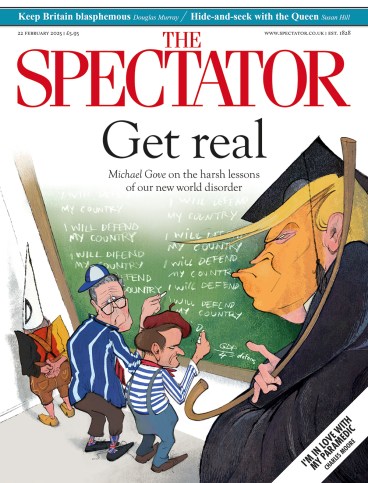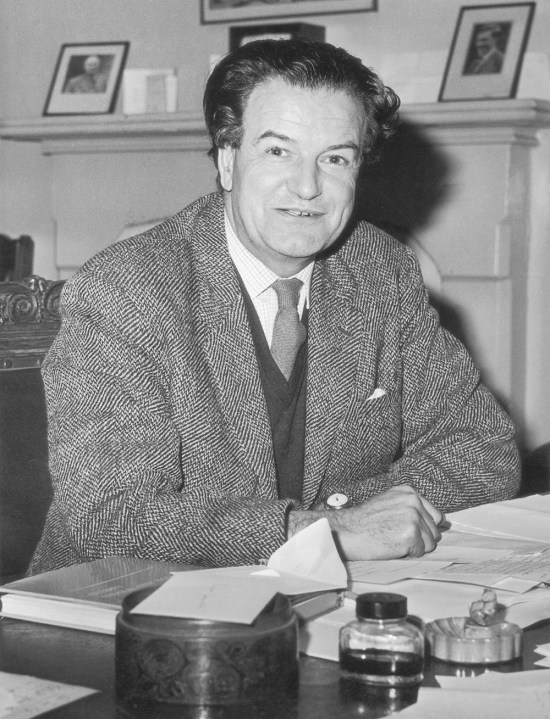
What did the great Marxist historian Christopher Hill think of orgies? Michael Braddick’s splendid and judicious biography doesn’t ponder this question. However, it strikes me as worth posing since, for a three-week period in the winter of 1978, an ensemble of actors (including the future Hollywood star Bob Hoskins) could be found naked at the National Theatre simulating group sex in Hill’s name.
The actors were performing in Keith Dewhurst’s radical stage adaptation of Hill’s masterpiece of 17th-century popular history The World Turned Upside Down (1972) and were embodying what it might have been like to be enthusiastic members of one of the radical millenarian sects at the centre of Hill’s study. The Evening Standard was scandalised; requiring performers to ‘jiggle their private parts’ for paying punters was nothing more than ‘gratuitous pornography’. When he attended rehearsals, by contrast, Hill seems not to have been outraged but, according to Dewhurst, ‘behaved with absolute modesty and tact’.
There can’t be many professional historians of the 17th century who have found themselves in this position. But, as Braddick’s book richly and scrupulously details, there haven’t been many historians like Christopher Hill. He didn’t publish his first scholarly monograph, Economic Problems of the Church (1956), until his forties, but by the end of his life he had written 25 books, several major source editions, and countless reviews, including 110 for The Spectator, even though he was, openly, a lifelong Marxist and sometime communist (he left the party in 1957).
As Master of Balliol College, Oxford, and a regular contributor to the Third Programme (a forerunner for Radio 3), Hill was a pre-eminent public intellectual who was also shy and occasionally laconic. Even after retirement he published ferociously, and in his eighties still gave history talks to children at his local library in Banbury. Better known for his readings of Karl Marx, he kept a protective eye on a smart, wayward Balliol undergraduate called Howard Marks, later a convicted drug smuggler and author of the bestselling autobiography Mr Nice. Hill offered him the chance to tutor sixth-formers at a Balliol summer school in the hope of giving him some direction. Unfortunately, after a pub crawl, Marks directed the students into a cinema on Walton Street to watch a porn film.
Hill’s mail was intercepted by Special Branch and MI5 for more than a quarter of a century
Without confessional diaries or authorial memoir affording access to Hill’s inner world, Braddick is less concerned with biographical vignettes than offering readers a fuller understanding of his subject’s intellectual life and milieux – in academia, the Foreign Office, the Communist party of Great Britain – and the conditions under which he worked. Hill’s mail was intercepted by Special Branch and MI5 for more than a quarter of a century, and just writing to him on an academic subject was enough to get you noticed by the spooks. As McCarthyism raged in the US, MI5 contemplated passing on the name of the historian David Underdown, then at Yale, to the FBI on that basis.
Hill came into political consciousness during the 1930s, seeing the rise of fascism as a crisis in bourgeois culture, and sought to understand that world by analysing the origins of bourgeois culture in the early modern period. His interpretation of that age as intimately connected to the present, and always mediated by Marxism and broadly socialist politics, was provocative; it was frequently derided by hostile contemporaries as political advocacy rather than scholarship.
Braddick is the surest of guides through these thickets, highlighting the enduring dimensions of Hill’s work while also pinpointing its shortfalls. He shows that Hill’s unrivalled mastery of early modern print sources at the expense of much meaningful engagement with the manuscript archive was greatly to the historian’s detriment. Braddick has no truck with the idea that Hill was always a crudely determinist thinker in the ‘vulgar’ Marxist mode, whereby economic forces or class determine all aspects of human life. He shows instead that, as the biographer of John Bunyan, John Milton and Oliver Cromwell, Hill was profoundly interested in the agency of individuals and the changes people can make.
While Braddick implicitly dissents from Hill’s central idea that the English civil war was a bourgeois revolution, where a capitalist order triumphed over a feudal one, he establishes that Hill’s sense of the conflict as globally significant, ‘a modernising political crisis’, is worth preserving. Hill was, to his great cost and regret, jaw-droppingly credulous about Stalin – in a 1953 essay he called him a ‘penetrating thinker’ and a ‘highly responsible leader’ – but he always remained impartial as a colleague and tutor. He was no Soviet agent, despite the gossip. This didn’t stop Ferdinand Mount telling readers of the Sunday Times that Hill had been ‘no more suited to guide young minds than a… paedophile’.
The insult that likely stung most came in the London Review of Books in 1996 when a critical piece by Mark Kishlansky referred to Hill as ‘Rolodex Man’. This was based on the belief that Hill had a ‘well-oiled’ card system containing facts, dates and quotations which he spun and selected from, instead of doing any new research. Braddick has found no Rolodex, but shows instead how Hill worked with notebooks or notecards in book form. What, retrospectively, makes that jibe especially cruel is that a few months after the review appeared, Hill gave a keynote lecture in London and blithely read an entire page of his script twice without noticing, showing signs of the dementia that would claim his final years.
Braddick’s excellent book reveals Hill’s commitment to overcoming obstacles to share his understanding of the 17th century with different audiences throughout his life, seeking to transform the relationship between the British left and the British past.








Comments